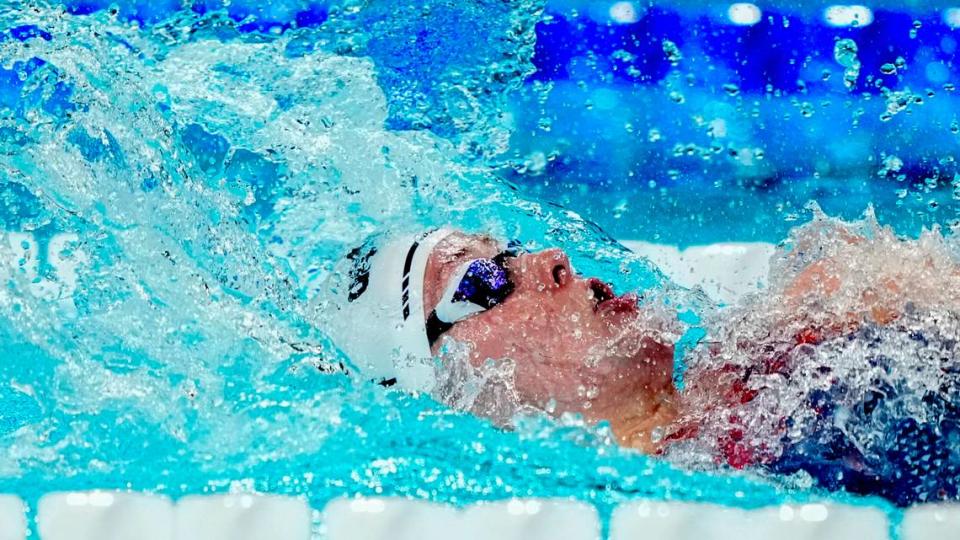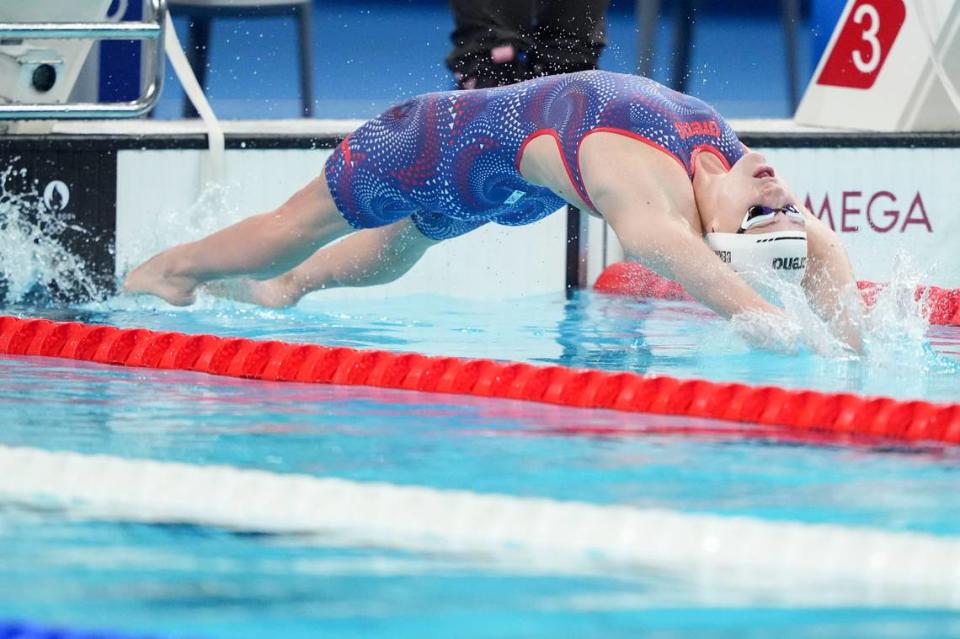NC State’s Katharine Berkoff, driven by setbacks, eyes gold in swimming at Olympics
- Oops!Something went wrong.Please try again later.
- Oops!Something went wrong.Please try again later.
Katharine Berkoff is ready.
The 23-year-old recent N.C. State graduate entered the 2024 Olympics as a five-time NCAA champion, 30-time All-American, and six-time ACC Champion. And, if her Olympic debut is any indication, she could be adding a gold medal to that collection of accolades.
Berkoff posted a time of 57.99 in the women’s 100-meter backstroke preliminary heats in Paris on Monday morning. She was the only swimmer under 58 seconds in prelims and will enter the semifinals as the top seed.
In the swimming world, this is a bit of an upset. Berkoff finished half a second ahead of Australia’s Kaylee McKeown (the defending champion in this event) and fellow American Regan Smith (current world record holder in the event).
But Berkoff has always envisioned this success for herself.
“I feel like my whole life I’ve kind of seen myself as an Olympian,” she said. “I’ve just always really believed that I would make it.”

Berkoff comes from an elite swimming pedigree. She’s the daughter of Dave Berkoff, a two-time Olympic champion in backstroke. Her mother, Shirley Gustafson, was also a backstroker. Katharine’s older brother, Cale, swam at the University of Minnesota. His event? You guessed it: backstroke.
“I think it’s the long arms, really flexible shoulders,” Gustafson said. “There’s definitely a body type for long axis swimmers. And so she got that for sure.”
It seems Katharine was destined for this stage. But three years ago, she missed qualifying for the Tokyo Olympics by a mere fraction of a second. That experience, though painful, was a catalyst for change. Katharine used it as motivation, calling it “the best thing that could’ve happened for my career in the long run.”
“It just lit a fire under me that otherwise wouldn’t have been there,” she said in June after her qualifying race. “The motivation I’ve had for the past three years has been huge.”
Starting young
Katharine called her shot from an early age. Gustafson recalls her daughter setting goals to be an Olympic swimmer, earn a gold medal and set a world record when she was just 10 or 11.
Many people have assumed, incorrectly, that this was a result of parent-imposed pressure. They’re wrong. Because while Katharine and her brother essentially grew up on a pool deck, she had to fight just to enter the water.
Dave recalls Katharine, age four, asking to join the swim team. He told her yes, under the condition she could swim across the pool.
Cap and goggles on, Katharine tried for about two and a half minutes until she succeeded.
“She gets out and goes, ‘Can I join the swim team now?’” Dave recalled. “And I said, ‘No, not until you turn five. So she had to do another round of lessons.”
Katharine wasn’t stellar, at least initially. She goofed off. The young swimmer needed a lot of underwater time to complete somersaults between reps.
“She didn’t appear to have the most talent in the pool,” Gustafson said. “I mean, her arms were just all over the place. And she flipped over on her back for half of her freestyle races so that she could get extra breath.”
But what separated Katharine was her belief. She grew up surrounded by Olympians. Her father used his connections in the swimming world to bring top talent back to Montana and put on swim clinics for their local club. David Cromwell, Aaron Peirsol, Eric Shanteau, Neil Walker and Ricky Berens are just a few of the Olympians Katharine got to know as a child. They’d stay at her family’s house and go fly fishing if there was some spare time.
Dave said this, more than his Olympic background, made an impression on his daughter.
“I think she grew up assuming everybody had friends who were Olympians, and this was a normal thing,” he said. “And so her mindset, I think it’s always been a little bit skewed to think that being elite is a normal thing.”
Managing emotions
Katharine’s confidence took a hit in 2021 when she narrowly missed a spot in the U.S. Olympic team. The setback wasn’t just a blow to her Olympic dreams but also to her self-perception as an athlete.
Gustafson recalls Katharine’s rigid mindset at the time, where she could only envision one outcome — making the Olympic team.
“There was no other alternative,” Gustafson said. “So when she didn’t make it, it was crushing. It was horrible and just heartbreaking.”
Recognizing the need for support, Katharine and her family sought help. She began working with Christen Shefchunas, a former All-American swimmer and professional confidence coach who helps elite athletes manage performance pressure.
Through several virtual sessions, Shefchunas helped Katharine manage the “scary thoughts” that would arise in high-pressure situations. By “getting honest” with these thoughts — instead of pretending they didn’t exist — Katharine learned to develop a healthier, more flexible mindset.
If she caught herself relapsing into negative thought patterns, Katharine said out loud, “I’m not going to go there with my mind.”
Braden Holloway, N.C. State head coach and Team USA assistant, said Katharine has been “dialed in” since the 2021 trials.
“It was about how consistent she could be, minimizing her bad practices to a single hand, and balancing adversity better,” he said. “You’re going to have bad days in a three-year span. Getting over those, learning from those, not looking at them as a sign of defeat, but as a chance to learn. She really got better in that capacity over the past three years.”

‘Huge weight off my shoulders’
That consistency in practice translated to consistent results. Following her disappointment in 2021, Katharine has earned 10 medals at international championships and two more 100-meter backstroke NCAA titles.
“The past three years I’ve just been trying to train in a way where I am 100% certain I could make the [Olympic] team,” Katharine said. “Just not being afraid of practice and trying to ease up on the pressure I put on myself.”
It was easier said than done. Katharine’s brain, as Shefchunas explains “just loves to go into the future.” This past winter, Katharine found herself freaking out over Olympic trials that were months away.
She reached back out to Shefchunas for help.
Katharine and Shefchunas developed a “what I know now” list. Katharine calls them her “confident thoughts.” This list served as a grounding mechanism, helping her refocus whenever anxiety began to take over. By concentrating on the positive and the known, she calmed her mind to approach her races with a clearer, more confident mindset.
“I think I’ve just kind of realized I would rather go into this Olympic trials not questioning whether or not I’m making it, but knowing I would make it,” she said.
During the 2024 Olympic Trials, Katharine still faced considerable nerves, especially before the finals. By successfully harnessing the mental tools she had cultivated, she had composure and executed her race strategy. Katharine finished the 100 backstroke with a time of 57.91 seconds, placing second behind Smith, who set a new world record at 57.13 seconds.
This achievement was more than sheer joy.
“It’s a huge weight off my shoulders,” Katharine said. “I think the hardest part for a lot of Americans is just getting to the Olympics, because it’s so competitive, and especially in women’s backstroke. I’m just super excited to finally be there and get my chance to perform at the Olympics.”

